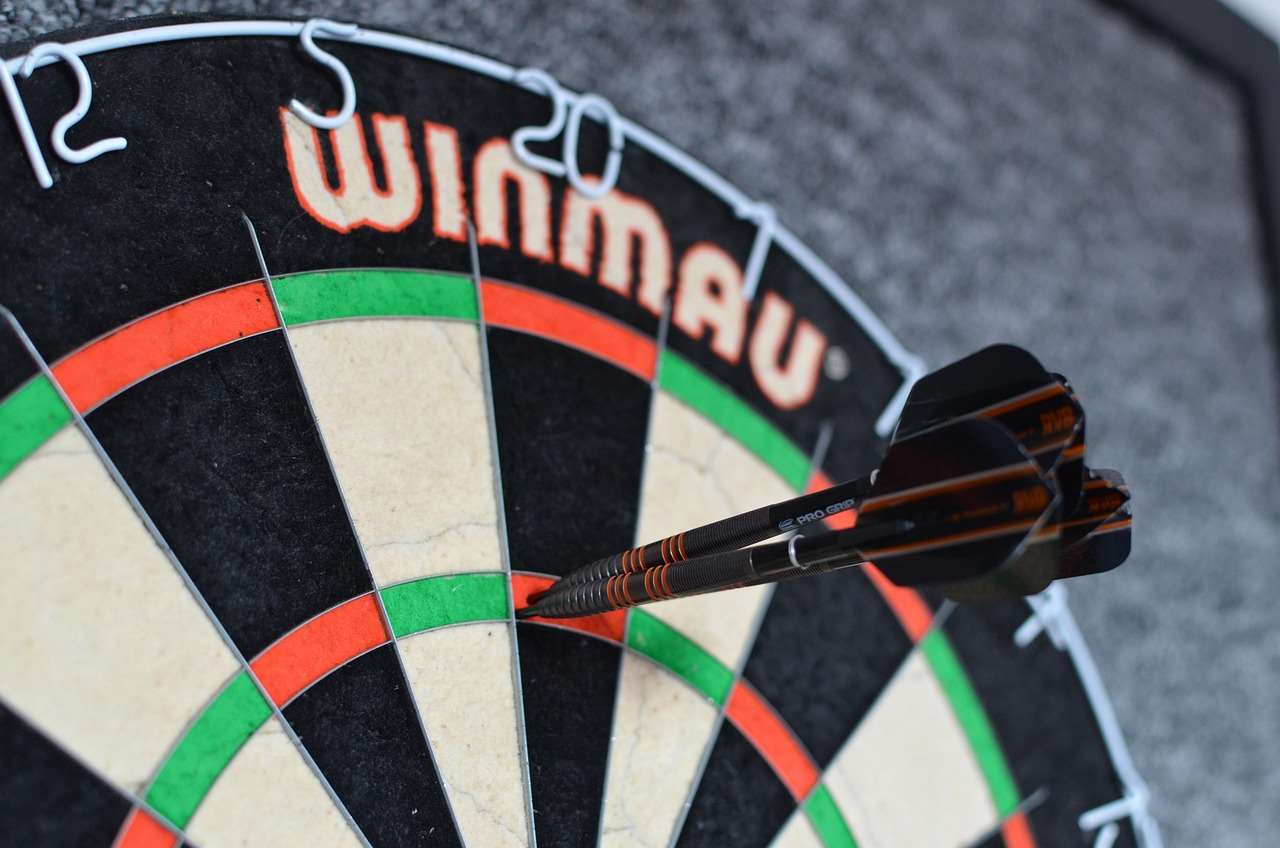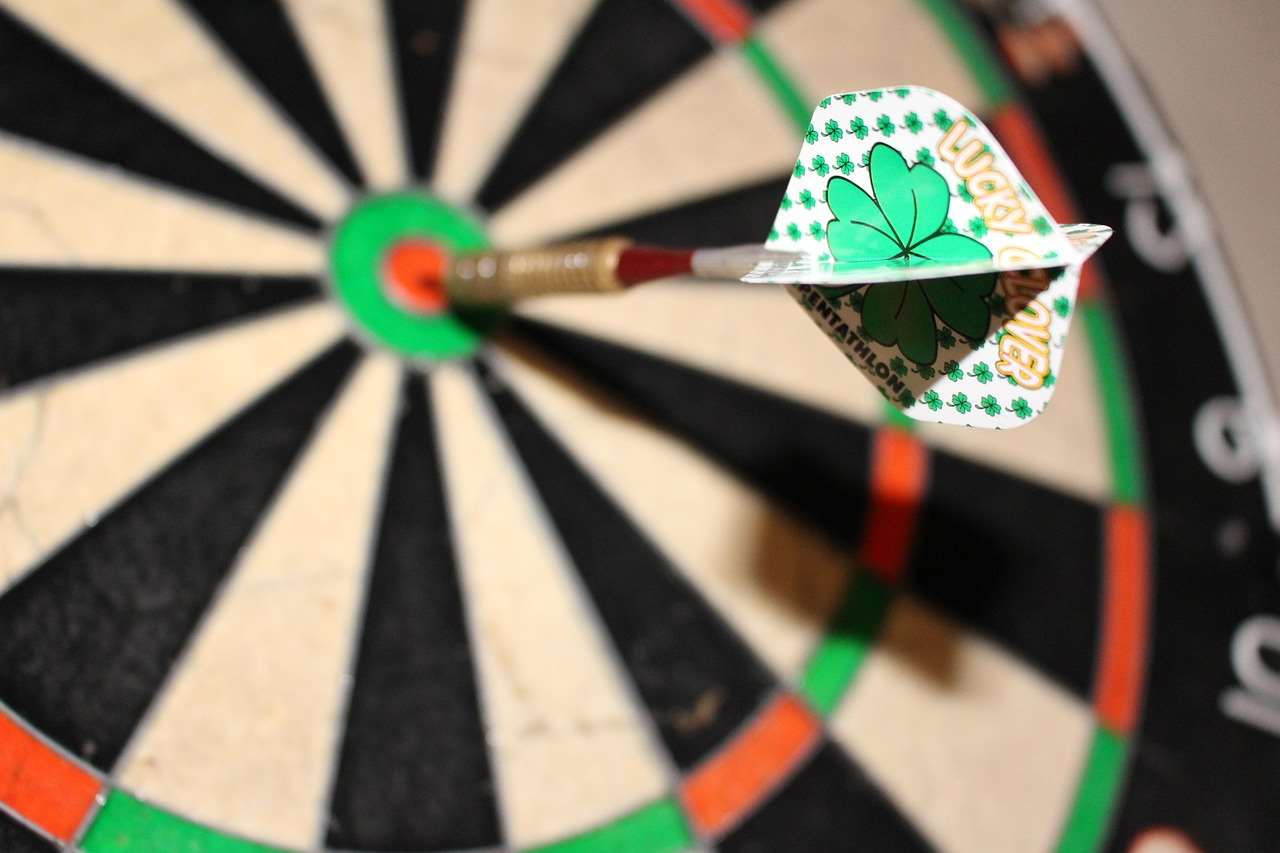The **Arbitrage Betting Profit Margin** represents the guaranteed return you can secure by placing bets on all possible outcomes of an event with different bookmakers offering varying odds. This article will explore how to calculate it, the factors influencing it, and strategies to maximize your profits through arbitrage betting, also known as sure betting.
⚠️ Still Using Pen & Paper (or a Chalkboard)?! ⚠️
Step into the future! The Dart Counter App handles all the scoring, suggests checkouts, and tracks your stats automatically. It's easier than you think!
Try the Smart Dart Counter App FREE!Ready for an upgrade? Click above!
Understanding Arbitrage Betting and Profit Margins
Arbitrage betting, often called “arbing,” is a strategy that leverages discrepancies in odds offered by different bookmakers to guarantee a profit, regardless of the outcome of the event. The **profit margin** in arbitrage betting is the percentage return on your total investment. It’s crucial to understand that this profit is typically small, often ranging from 0.5% to 5%, but it’s risk-free if executed correctly.
To illustrate, imagine a tennis match between Player A and Player B. Bookmaker 1 offers odds of 2.10 for Player A to win, while Bookmaker 2 offers odds of 2.05 for Player B to win. By strategically placing bets on both outcomes, you can ensure a profit. Calculating the implied probability and total stake is crucial to determining your **Arbitrage Betting Profit Margin**.
Calculating Arbitrage Betting Profit Margin
The calculation involves several steps:
- Convert odds to implied probabilities: Divide 1 by the decimal odds for each outcome. For example, odds of 2.10 imply a probability of 1/2.10 = 0.476 (47.6%).
- Sum the implied probabilities: Add the implied probabilities of all outcomes. In the example, 0.476 + 1/2.05 (0.488) = 0.964.
- Calculate the arbitrage percentage: If the sum of implied probabilities is less than 1 (or 100%), an arbitrage opportunity exists. In this case, the arbitrage percentage is 96.4%.
- Determine the profit margin: Subtract the arbitrage percentage from 1 (or 100%). 100% – 96.4% = 3.6%. This is your potential **Arbitrage Betting Profit Margin**.
This 3.6% represents the guaranteed profit you’ll make on your total stake, irrespective of who wins the tennis match. The next step involves determining how much to stake on each outcome to realize this profit. Using Player Statistics For Darts Betting might help you evaluate the potential profit in other sports as well.

Example Calculation Breakdown
Let’s say you have a total betting budget of $1000. To calculate the optimal stake for each outcome:
- Stake on Player A (odds 2.10): (Profit Margin / Implied Probability for Player A) * Total Budget. In this case, (0.036 / 0.476) * $1000 = $75.63.
- Stake on Player B (odds 2.05): (Profit Margin / Implied Probability for Player B) * Total Budget. In this case, (0.036 / 0.488) * $1000 = $73.77.
Your total stake is $75.63 + $73.77 = $149.40. If Player A wins, you receive $75.63 * 2.10 = $158.82. Your profit is $158.82 – $149.40 = $9.42, which represents approximately 3.6% of your initial $149.40 stake. If Player B wins, you receive $73.77 * 2.05 = $151.23. Your profit is $151.23 – $149.40 = $1.83. The slight difference is due to rounding.
Factors Influencing Arbitrage Betting Profit Margin
Several factors can influence the **Arbitrage Betting Profit Margin**:
- Bookmaker discrepancies: The greater the difference in odds between bookmakers, the higher the potential profit margin. Actively comparing odds across numerous platforms is essential.
- Betting limits: Bookmakers often impose limits on the maximum stake you can place. These limits can restrict your ability to fully capitalize on arbitrage opportunities and reduce your overall profit.
- Account restrictions: Bookmakers may restrict or ban accounts that consistently engage in arbitrage betting. This is a significant risk factor to consider.
- Transaction fees: Deposit and withdrawal fees can eat into your profit margin, especially if you’re dealing with small arbitrage opportunities.
- Odds movement: Odds can change rapidly, particularly close to the start of an event. This can invalidate an arbitrage opportunity if you’re slow to place your bets. Utilizing specialized software can help mitigate this risk.
Successfully exploiting arbs requires quick decision-making and efficient execution. Understanding How To Analyze Dart Player Form efficiently allows quicker betting decisions in darts.
Strategies to Maximize Your Arbitrage Betting Profit Margin
While the **Arbitrage Betting Profit Margin** is inherently small, there are strategies to improve your returns:
- Use arbitrage betting software: These tools scan numerous bookmakers in real-time and identify arbitrage opportunities automatically. This saves you significant time and increases your efficiency.
- Diversify your bookmaker accounts: Having accounts with multiple bookmakers increases your access to a wider range of odds and allows you to exploit more arbitrage opportunities.
- Utilize betting exchanges: Betting exchanges like Betfair often offer better odds than traditional bookmakers, creating more lucrative arbitrage opportunities. Consider exploring **back and lay betting** options.
- Focus on niche sports and markets: Less popular sports and markets often have less efficient odds, leading to larger discrepancies and higher potential profit margins.
- Manage your bankroll effectively: Avoid risking too much of your capital on any single arbitrage bet. A sound bankroll management strategy is crucial for long-term success.

The Risks Involved in Arbitrage Betting
Despite being considered “risk-free” in theory, arbitrage betting does come with several risks:
- Mistakes: Placing incorrect stakes or overlooking key terms and conditions can lead to losses. Careful attention to detail is paramount.
- Bookmaker errors: Bookmakers can occasionally make errors in their odds, which they may subsequently correct, voiding your bet.
- Account limitations: As mentioned earlier, bookmakers may restrict or ban accounts suspected of arbitrage betting. This limits your ability to continue using the strategy.
- Stuck funds: You may encounter situations where your funds are “stuck” at a bookmaker due to withdrawal limits or verification issues.
Mitigating these risks requires meticulous planning, disciplined execution, and a thorough understanding of the terms and conditions of each bookmaker you use. Before investing heavily, consider testing your strategy with small stakes.
Tools and Resources for Arbitrage Betting
Several tools and resources can assist you in arbitrage betting:
- Arbitrage betting software: Examples include RebelBetting, OddsJam, and BetBurger. These tools automate the process of identifying arbitrage opportunities.
- Odds comparison websites: These websites allow you to compare odds across multiple bookmakers manually.
- Calculators: Arbitrage calculators help you quickly calculate the optimal stake for each outcome and determine your potential profit.
- Online forums and communities: These platforms provide a space for sharing information, strategies, and tips related to arbitrage betting.
Before committing to any specific tool or resource, research thoroughly and consider the cost-benefit ratio. Start with free trials where available.

Arbitrage Betting vs. Value Betting
While both arbitrage betting and **value betting** aim to profit from bookmaker inefficiencies, they differ significantly. Arbitrage betting guarantees a profit by exploiting discrepancies across different bookmakers. Value betting, on the other hand, involves identifying bets where the odds offered by the bookmaker are higher than the true probability of the event occurring, according to your own analysis.
Value betting doesn’t guarantee a profit on each individual bet but relies on the law of large numbers to generate profit over time. It’s a higher-risk, higher-reward strategy compared to arbitrage betting. While both strategies can be profitable, understanding their differences is crucial for choosing the one that best suits your risk tolerance and betting style. Many bettors start with arbitrage to build capital and then transition into value betting.
Long-Term Sustainability of Arbitrage Betting
The long-term sustainability of arbitrage betting depends on several factors, including your ability to adapt to changing market conditions, manage your bankroll effectively, and avoid attracting unwanted attention from bookmakers. Bookmakers are constantly improving their odds-setting algorithms and taking measures to identify and limit arbitrage bettors.
Therefore, it’s essential to stay informed about the latest developments in the industry and continuously refine your strategy. Diversifying your betting activities and avoiding overly aggressive arbitrage tactics can help prolong your profitability. Remember, the goal is to maintain a low profile and avoid triggering any red flags. Understanding factors related to Recent Form Impact Darts Betting might help in diverse betting strategies.

Advanced Techniques for Maximizing Arbitrage Betting Profit Margin
Experienced arbitrage bettors often employ advanced techniques to further enhance their **Arbitrage Betting Profit Margin**. These include:
- Hedging: Using betting exchanges to hedge your bets and lock in profits.
- Dutching: A staking method used to distribute stakes across multiple selections in the same event to guarantee a profit.
- Middling: Exploiting situations where a bookmaker offers a line or spread that falls between the lines offered by other bookmakers.
- Bonus abuse: Taking advantage of bookmaker promotions and bonuses to increase your arbitrage profits (this can be risky and may violate terms and conditions).
Mastering these techniques requires a significant amount of experience and a deep understanding of betting markets. Proceed with caution and ensure you fully understand the risks involved before attempting these advanced strategies.
The Future of Arbitrage Betting
The future of arbitrage betting is uncertain. As bookmakers become more sophisticated and technology advances, arbitrage opportunities may become increasingly scarce. However, inefficiencies will likely always exist in betting markets, creating opportunities for astute bettors.
The key to long-term success in arbitrage betting lies in adaptability, continuous learning, and a willingness to embrace new technologies and strategies. Those who can stay ahead of the curve will be best positioned to capitalize on the ever-evolving landscape of online betting. Consider also evaluating Head To Head Stats Darts Betting for potential arbitrage opportunities in that niche.

Conclusion
The **Arbitrage Betting Profit Margin**, while often small, offers a guaranteed return by exploiting odds discrepancies across bookmakers. Understanding the calculations, factors influencing the margin, and potential risks is paramount. While strategies exist to maximize profits, a disciplined approach, continuous learning, and responsible bankroll management are crucial for long-term success. Arbitrage betting is not a get-rich-quick scheme; it requires dedication, patience, and a keen eye for detail. If you’re ready to explore the world of arbitrage betting, start small, learn continuously, and always prioritize responsible gambling. Explore arbitrage betting with caution and diligence. Your journey into this complex world should always begin with research and practice.
Hi, I’m Dieter, and I created Dartcounter (Dartcounterapp.com). My motivation wasn’t being a darts expert – quite the opposite! When I first started playing, I loved the game but found keeping accurate scores and tracking stats difficult and distracting.
I figured I couldn’t be the only one struggling with this. So, I decided to build a solution: an easy-to-use application that everyone, no matter their experience level, could use to manage scoring effortlessly.
My goal for Dartcounter was simple: let the app handle the numbers – the scoring, the averages, the stats, even checkout suggestions – so players could focus purely on their throw and enjoying the game. It began as a way to solve my own beginner’s problem, and I’m thrilled it has grown into a helpful tool for the wider darts community.